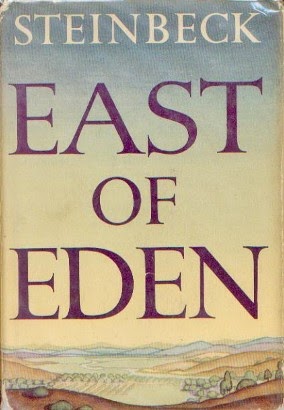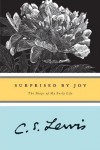East of Eden by John Steinbeck
"The Salinas Valley is in Northern California."
I usually don't worry about giving warning about spoilers but I've discovered that's because I normally read pre-1850-ish books and, while plot is important, there is much more from the book to be gained. However, 20th century literature, seems to rely a great deal on the story, and so I'm issuing a warning that his review does contain a few spoilers, therefore, continue at your own risk.
Written in 1952, Steinbeck considered East of Eden his magnum opus. At the time, Steinbeck was separated from his two young sons by divorce and he felt a need, not only to communicate with them through his creative medium, but to share family history in a manner that would make it a permanent record. Yet Steinbeck was also sensitive to his readers, aware that he would have to paint the well-known Salinas Valley of his youth with a vibrant brush of memories, in order to endow the people and the place with dynamic yet corporeal life. Writing in his journal on his first day of work on the novel, Steinbeck described his process: "But [I] try to relate the reader to the book, so while I am talking to the boys actually, I am relating every reader to the story as though he were reading about his own background ........ Everyone wants to have a family. Maybe I can create a universal family living next to a universal neighbor."
 |
| Rural Youth, Monterey California 1940 source Wikimedia Commons |
As in any good history, the historian wishes to imbue the characters with personality and, in this case, the Valley itself is a character, merging with the people to form a unique examination of this time in history. Steinbeck uses the Salinas Valley as a microcosm to examine human nature, both its strengths and its frailties, its goodness and its evil. As you read through the novel, you almost feel as if all the characters have a little of Steinbeck in their make-up. It's as if, through them, he was exploring not only family history, but also the history of man, the mutations caused by evil and the healing caused by goodness, set against the background of free will and choice.
With the use of the title East of Eden, Steinbeck brings in the biblical story of Cain and Abel, infusing both the relationship of the brothers, Adam and Charles Trask, and then Adam's two twin sons, Aron and Caleb, with the jealousy, impulses and sinful passions of the former. Both sets of brothers contend against each other, while still being bound by their ties of family and a rather strange type of love. The story of Steinbeck's own maternal family, the Hamiltons, parallels that of the Trask's, beginning with his grandfather, Samuel Hamilton, whom one could describe almost as a philosopher-farmer, down to the brief appearance of Steinbeck himself in the work. On the Trask side, Adam is the main focus, as are his two sons and their Chinese servant, Lee, who is himself a philosopher.
| Salinas Valley 1940 source Wikimedia Commons |
For me, much of the embodiment of the novel was contained in the grave prophecy of Samuel Hamilton, just before Adam Trask purchases his land in the Salinas Valley: "There's a blackness on this valley. I don't know what it is, but I can feel it. Sometimes on a white blinding day I can feel it cutting off the sun and squeezing the light out of it like a sponge ....... There's a black violence on this valley. I don't know ---- I don't know. It's as though some old ghost haunted it with unhappiness. It's as secret as hidden sorrow. I don't know what it is, but I see it and feel it in the people here." This "black violence" hovers over the story like a pall, and the characters are perpetually struggling to rise above it. Charles Trask battles against an inner hatred that nearly makes him murder his brother, Adam Trask contends against guilt and indifference, Caleb against a perceived inner badness which warps his actions and mars his character, Aron, the good and favoured son, becomes tormented by thoughts and events that are too evil to be conceived by his goodness, and Cathy, the mother of the twins, is pure evil, a psychopathic sociopath whose pathological desire for revenge drives her every action. There is an echoing of sins passed down through generations, and behaviours that resist change. While Lee and Adam discuss the story of Cain and Abel, they decide, quite wisely, that even though sins may be persistent, there is always choice:
"Don't you see?" he cried. "The American Standard translation orders men to triumph over sin, and you can call sin ignorance. The King James translation makes a promise in 'Thou shalt,' meaning that men will surely triumph over sin. But the Hebrew word, the word timshel --- 'Thou mayest' --- that gives a choice. It might be the most important word in the world. That says the way is open. That throws it right back on a man. For if 'Thou mayest' ----- it is also true that 'Thous mayest not.' Don't you see?"
"Choice" is unarguably one of the most important words, yet healthy choice does not seem attainable by these characters, and the black violence of Hamilton's perception clouds out the sun. Throughout the novel, nearly every person, while occasionally getting a breath of fresh air, still appears to be drowning in it.
There were many parts of the book that were implausible. A Chinese servant who can not only speak English and philosophize better than a university professor, can also turn into a Hebrew scholar when need be, and then later gain as much knowledge as a doctor specializing in diseases of the brain. The reader is introduced to the token crazy religious person, yet this person had appeared the most balance and grounded character of them all, up until his conversion. And one of the main characters, while recognizing his sinful impulses, has absolutely no control over them, yet he is the hereditary son who remains to carry on the family name. Lee's discovery of timshel, or "Thou mayst", at the end of the book perhaps has an affect on the father, yet the son is changeless throughout, merely experiencing a rollercoaster of undisciplined actions and regrets.
 |
| Watsonville, Salina Valley source Wikimedia Commons |
Yet in spite of the difficulties, Steinbeck attempted quite a feat with this novel and I can certainly appreciate his dream and his attempt to bring that dream to fruition. Writing the novel was more of an outpouring of creative spirit for Steinbeck: "I stay fascinated with East of Eden .... never has a book so intrigued me. I only hope other people enjoy reading it as much as I am enjoying writing it." Yet he did not exhibit any naiveté toward the reaction that his work was destined to elicit. Writing to his editor, he admitted: "You know as well as I do that this book is going to catch the same type of hell that all the others did and for the same reasons. It will not be what anyone expects and so the expectors will not like it." After publication, the critics remained curiously divided, the book being described as "one of Steinbeck's best novels" on one hand, and on the other drawing disparaging comments such as, "a huge grab bag in which pointlessness and preposterous melodrama pop up frequently as good storytelling and plausible conduct." Yet in spite of sometimes vicious criticisms, many readers enjoyed what the critics discredited and the book has become an enduring classic in its own right. As for me, I respect Steinbeck's effort and love for his work, and perhaps that is good enough.
Notable quotes:
"And this I believe: that the free, exploring mind of the individual human is the most valuable thing in the world. And this I would fight for: the freedom of the mind to take any direciton it wishes, undirected. And this I must fight against: any idea, religion, or government which limits or destroys the individual. This is what I am and what I am about. I can understand why a system built on a pattern must try to destroy the free mind, for that is one thing which can by inspection destroy such a system. Surely I can understand this, and I hate it and I will fight against it to preserve the one thing that separates us from the uncreative beasts. If the glory can be killed, we are lost."

 3
3
 4
4









